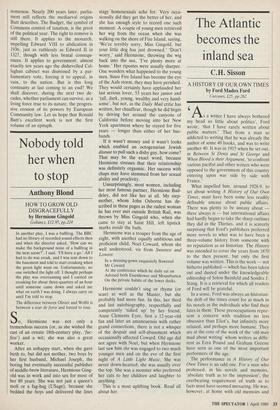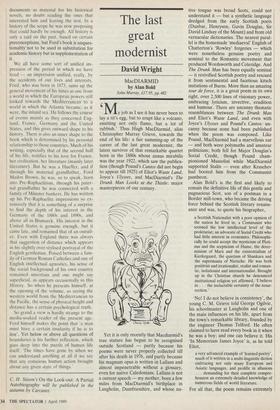The Atlantic becomes the inland sea
C.H. Sisson
A HISTORY OF OUR OWN TIMES by Ford Madox Ford Carcanet, £25, pp.262 As a writer I have always bothered my head so little about politics', Ford wrote, 'that I have rarely written about public matters.' That from a man so addicted to writing that he was already the author of some 40 books, and was to write another 40. It was in 1915 when he set out, in Between St Denis and St George and When Blood is their Argument, `to confront various pacifist and other writers who were opposed to the government of this country entering upon war side by side with France.'
What impelled him, around 1928-9, to set about writing A History of Our Own Times, must have been some less readily definable unease about public affairs. There was plenty to be uneasy about there always is — but international affairs had hardly begun to take the sharp outlines they did in the Thirties, and it is scarcely surprising that Ford's publishers preferred more novels to what was to have been a three-volume history from someone with no reputation as an historian. The History was intended to cover the years from 1870 to the then present, but only the first volume was written. This is the work — not hitherto published — which has been taken out and dusted under the knowledgeable editorship of Solon Beinfeld and Sondra J. Stang. It is a retrieval for which all readers of Ford will be grateful.
In a sense, Ford was always an historian: the drift of the times count for as much in his novels as the individuals who find their fates in them. These preoccupations repre- sent a concern with tradition no less obsessive than Eliot's, but infinitely more relaxed, and perhaps more humane. They are at the core of the work of the 'old man mad about writing' whom writers as diffe- rent as Ezra Pound and Graham Greene have seen as one of the most important performers of the age.
The performance in A History of Our Own Times is an odd one. For a man who professed, in his novels and memoirs, 'absolute truth as to the impression', the overbearing requirement of truth as to facts must have seemed menacing. He was, however, at home with old memoirs and
documents as material for his historical novels, no doubt reading the ones that interested him and leaving the rest. In a history of the scope he was now proposing that could hardly he enough. All history is only a raid on the past, based on certain preconceptions, but Ford's book is unques- tionably-not to be used in substitution for academic history but in supplementation of it.
We all have some sort of unified im- pression of the period in which we have lived — an impression unified, really, by the accidents of our lives and interests. Ford, who was born in 1873, sums up the general movement of his times as one from a world in which the European powers still looked towards the Mediterranean to a world in which the Atlantic became, as it were, the inland sea. He follows the course of events mainly as they concerned Eng- land, France, Germany and the United States, and this gives outward shape to his history. There is also an inner shape to the book which is determined by his personal relationship to those countries. Much of his writing, especially that of the second half of his life, testifies to his love for France, her civilisation, her literature (mainly later literature). But he was a Hueffer, and if through his maternal grandfather, Ford Madox Brown, he was, so to speak, born into Pre-Raphaelitism, through his pater- nal grandfather he was connected with a family of Miinster hankers. He has written up his Pre-Raphaelite impressions so ex- tensively that it is something of a surprise to find the depth of his interest in the Germany of the 1880s and 1890s, and above all in Bismarck. His interest in the United States is genuine enough, but it came late, and remained that of an outsid- er. Even with England there was always that suggestion of distance which appears in his slightly over-stylised portrayal of the English gentleman. Poised between a fam- ily of German Roman Catholics and one of English intellectual agnostics, his sense of the social background of his own country remained uncertain and one might say superficial, as appears occasionally in this History. So when he presents himself, at the opening of the volume, as seeing the western world from the Mediterranean to the Pacific. the sense of physical height and distance has a certain psychological truth.
So grand a view is hardly strange to the media-soaked reader of the present age. Ford himself makes the point that 'a man must have a certain insularity if he is to live'. Yet below or above all questions of boundaries is his further reflection, which goes deep into the puzzle of human life itself: The times have gone by when we can understand anything at all if we say that any conscious human action brought about any given state of things.'
C. H. Sisson's On the Look-out: A Partial Autobiography will be published in the autumn by Carcanet.



















































 Previous page
Previous page